Related Research Articles
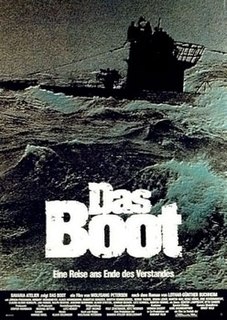
Das Boot is a 1981 West German war film written and directed by Wolfgang Petersen, produced by Günter Rohrbach, and starring Jürgen Prochnow, Herbert Grönemeyer, and Klaus Wennemann. It has been exhibited both as a theatrical release and as a TV miniseries (1985), in several different home video versions of various running times, and in a director's cut version supervised by Petersen in 1997.

Hans-Joachim Kulenkampff, nickname Kuli was a German actor and TV host, remembered mainly as host of Einer wird gewinnen, a quiz show that ran from 1964 to 1987.
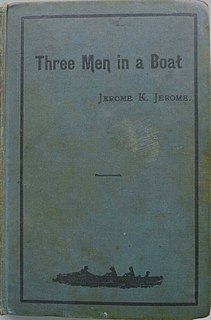
Three Men in a Boat , published in 1889, is a humorous account by English writer Jerome K. Jerome of a two-week boating holiday on the Thames from Kingston upon Thames to Oxford and back to Kingston. The book was initially intended to be a serious travel guide, with accounts of local history along the route, but the humorous elements took over to the point where the serious and somewhat sentimental passages seem a distraction to the comic novel. One of the most praised things about Three Men in a Boat is how undated it appears to modern readers – the jokes have been praised as fresh and witty.

Jürgen Prochnow is a German–American actor and voice actor. His best-known roles internationally have been as the good-hearted and sympathetic U-Boat captain in Das Boot (1981), Duke Leto Atreides in Dune (1984), the minor but important role of Kazakh dictator General Ivan Radek in Air Force One (1997), and the antagonist Maxwell Dent in Beverly Hills Cop II (1987).

Heinrich Wilhelm "Heinz" Rühmann was a German film actor who appeared in over 100 films between 1926 and 1993. He is one of the most famous and popular German actors of the 20th century, and is considered a German film legend. Rühmann is best known for playing the part of a comic ordinary citizen in film comedies such as Three from the Filling Station and The Punch Bowl. During his later years, he was also a respected character actor in films such as The Captain from Köpenick and It Happened in Broad Daylight. His only English-speaking movie was Ship of Fools in 1964.

Horst Tappert was a German movie and television actor best known for the role of Inspector Stephan Derrick in the television drama Derrick.

Johannes Robert Becher was a German politician, novelist, and poet. He was affiliated with the Communist Party of Germany (KPD) before World War II. At one time, he was part of the literary avant-garde, writing in an expressionist style.

Heinz Erhardt was a German comedian, musician, entertainer, actor, and poet.
Harry Alfred Robert Kupfer was a German opera director and academic. A long-time director at the Komische Oper Berlin, he worked at major opera houses and at festivals internationally. Trained by Walter Felsenstein, he worked in the tradition of realistic directing. At the Bayreuth Festival, he staged Wagner's Der fliegende Holländer in 1978 and Der Ring des Nibelungen in 1988. At the Salzburg Festival, he directed the premiere of Penderecki's Die schwarze Maske in 1986 and Der Rosenkavalier by Richard Strauss in 2014.

Gustav Fröhlich was a German actor and film director. He landed secondary roles in a number of films and plays before landing his breakthrough role of Freder Fredersen in Fritz Lang's 1927 film Metropolis. He remained a popular film star in Germany until the 1950s.
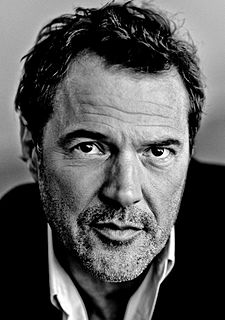
Sebastian Koch is a German television and film actor. He is known for roles in the 2007 Academy Award-winning film The Lives of Others, in Steven Spielberg’s Bridge of Spies, and as Otto Düring in the fifth season of the Showtime series Homeland.
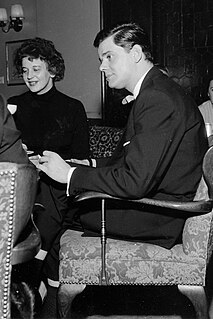
Walter Giller was a German actor. He was very successful in the 1950s and 1960s, when he was often seen as a comedic leading men. One of his most successful and more serious roles was in Roses for the Prosecutor.
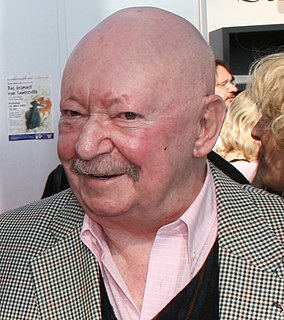
Günter Kunert was a German writer. Based in East Berlin, he published poetry from 1947, supported by Bertold Brecht. When he signed a petition against the deprivation of the citizenship of Wolf Biermann in 1976, he lost his SED membership, and moved to the West two years later. He is regarded as a versatile German writer who wrote short stories, essays, autobiographical works, film scripts and novels. He received international honorary doctorates and awards.
A Christian Hebraist is a scholar of Hebrew who comes from a Christian family background/belief, or is a Jewish adherent of Christianity. The main area of study is that commonly known as the Old Testament to Christians, but Christians have occasionally taken an interest in the Talmud, and Kabbalah.

The Grimme-Preis is a television award and one of the most prestigious awards for German television. It is named after the first general director of Nordwestdeutscher Rundfunk, Adolf Grimme. It has been referred to in the Kino magazine as the "German TV Oscar".

Kurt Vespermann was a German stage and film actor.

Loni Heuser was a German film actress.

Franz Kurowski was a German author of fiction and non-fiction who specialised in World War II topics. He is best known for producing apologist, revisionist and semi-fictional works on the history of the war, including the popular English-language series Panzer Aces and Infantry Aces.
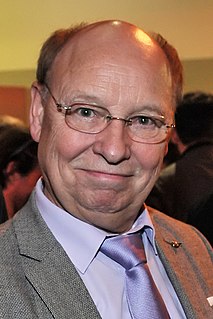
Hans-Joachim Heist is a German actor and comedian.